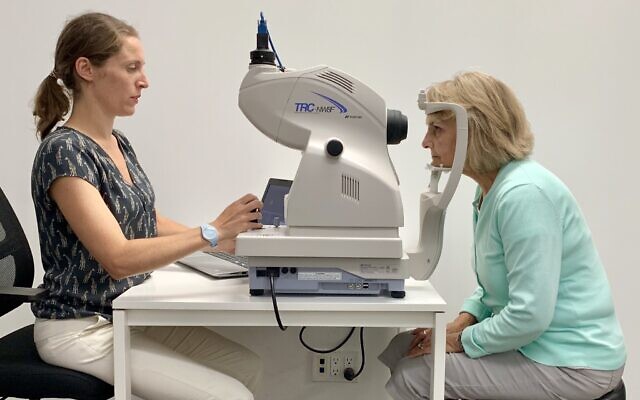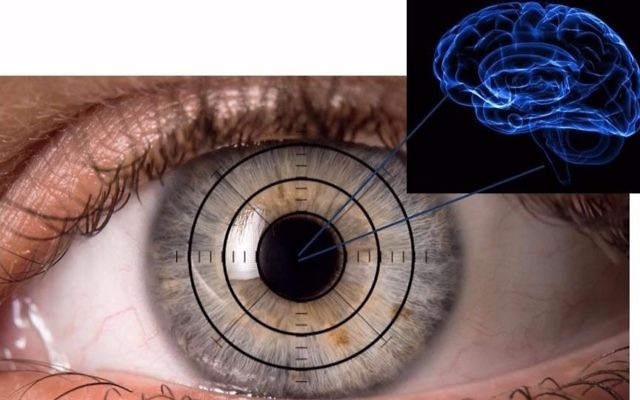
Israeli expatriate biomedical engineers Eliav Shaked and Roy Kirshon may be far from old age but one of its dreaded curses — Alzheimer’s disease (AD) — figures prominently in their lives.
As business partners in an artificial intelligence medical imaging start-up in Toronto called RetiSpec, they’ve developed a new way for early detection of AD, the main cause of dementia among older adults.
In recent years, the World Health Organization has signaled the growing scourge of dementia (attributed mostly to AD) as a global epidemic. Tied, in part, to an aging population, an estimated 47 million people around the world now suffer from AD or related dementia.
“The problem today is the point at which you diagnose Alzheimer’s,” Shaked, 37, told The Times of Israel during a recent interview with him and Kirshon at a Toronto outdoor cafe. “By then, there’s already a neurodegenerative process that’s affecting the way the person thinks and reasons, which is caused by a pathological change in the brain that started 10 or 20 years before those clinical symptoms.”
Given AD’s growing death toll and the massive social and economic burden of caring for millions of patients, the disease looms large on society’s agenda. That’s heightened the interest and support RetiSpec has attracted for its work to replace current diagnostic procedures for identifying AD which are costly and impractical.
RetiSpec’s diagnostic tool, named RS1, provides a far simpler, less expensive alternative to the discomfort and inconvenience of current practices — a spinal tap or PET scan — for detecting AD early. It’s hoped this will help in developing more effective treatments and, ultimately, a prevention for AD.
“By the time Alzheimer’s is now diagnosed, it’s already way too late,” says Shaked. “The horse is out of the barn. This is the reality clinicians and neurologists face today. If COVID has taught us one thing, it’s that early, accurate diagnostics are key in assessing epidemiological cases and supporting therapeutics.”
If COVID has taught us one thing, it’s that early, accurate diagnostics are key
Dr. Sharon Cohen, a behavioral neurologist specializing in diseases of memory and cognition who is an expert on Alzheimer’s research and clinical care, echoes Shaked’s view. As the medical director of Toronto Memory Program, a medical facility established in 1996 dedicated to the diagnosis and treatment of Alzheimer’s and related disorders, she’s the principal investigator in a current validation study of RetiSpec’s technology.
“Early diagnosis is important,” says Cohen, “even if some people say ‘why diagnose early and just extend the time that a person lives with bad news.’ But we think about it differently. There’s a lot to be done when you make an early diagnosis. It helps get on with the business of preparing appropriate care and improving the quality of life and support for patients and their families. It also helps facilitate research into treatment and finding a cure.”
The ball is rolling
In the latest boost for their company, Shaked and Kirshon concluded a partnership agreement in October with Gentex Corporation, a major US-based global hi-tech electronics firm, to engineer, manufacture and commercialize RS1, which uses retinal imaging to look at the back of the eye as a small window to the brain.
It was the most recent in a series of auspicious developments for RetiSpec. Last November, it won the annual iGan Partners’ Pitch to Heal Event, securing a $250,000 investment from iGan. A month earlier, it received an award from the Alzheimer’s Drug Discovery Foundation to accelerate commercialization of the company’s retinal imaging technology. Supported by Bill Gates and Jeff Bezos, among others, the award of up to $500,000 includes a direct investment in the company.
In 2019, the Ontario Bioscience Innovation Organization chose RetiSpec as one of several high-potential health science companies for its Capital Access Advisory Program.
RetiSpec has also received funding from the Toronto-based Ontario Brain Institute and Centre for Aging and Brain Health Innovation. Recently, Shaked and Kirshon completed a second successful funding round with both Canadian and Israeli investors.

“What we’ve developed is non-invasive, quick, easy-to-use and allows for the user, the clinician, to get the results right there on the spot,” says Shaked, who received his BA and MA in bioengineering at Tel Aviv University and has long been passionate about the human brain. “We’ve focused a lot on ensuring the device’s user-friendliness and addressing key needs from a clinical perspective for this to be a successful clinical utility.”
RetiSpec’s RS1 consists of a hyperspectral retinal camera and attached software involving artificial intelligence. It analyzes how light reflects off the back of a person’s eye to identify bits of harmful amyloid proteins and other evidence that indicate AD, even before the patient shows symptoms. The device draws on technology developed by Robert Vince and Swati More at the University of Minnesota’s Center for Drug Design.
In contrast to current options, RS1 provides a painless, more accessible biomarker screening done in only 10 minutes. It’s intended for use in the office of an eye doctor whose retinal cameras would be modified with the addition of RetiSpec’s software and supersensitive camera mounted on standard machines now used by optometrists and ophthalmologists for routine retinal exams.
Retinal imaging is something that exists today. What we know how to do is to make those cameras smarter
“Retinal imaging is something that exists today,” says 36-year-old Kirshon. “You do it when you go to your optometrist. What we know how to do is to make those cameras smarter, with a little accessory and software that can acquire images much richer in data allowing us to see things that beforehand were impossible to see using normal retinal imaging.”
Vetting and oversight
As with any new medical apparatus, comprehensive research, development and testing are required as part of a regulatory application. To that end, RetiSpec made several prototypes of the device for use in ongoing multiple clinical tests before it will be submitted to regulatory authorities in the US, Canada and Europe for approval so the company can market it.
RetiSpec’s initial proof of concept study began in 2018 with its partners at the University of Minnesota. The next year, its first clinical validation study took place at the Sagol Neuroscience Center at the Sheba Medical Center in Ramat Gan followed by other studies at Toronto’s Memory Program. The onset of COVID-19 delayed testing at the Mass General Hospital in Boston, which will resume once the pandemic has passed.

“Preliminary results and findings from our current clinical validation studies really boost our confidence and help us understand the incredible potential in bringing this device to market,” says Shaked, whose participation in 2015 in the Google-supported Singularity University’s Global Solutions Program for entrepreneurs in California’s Silicon Valley inspired him to create RetiSpec. “We’ve brought together a lot of serious, global partners who believe in what we’re doing, believe in our team and are helping us get to the point that we’ll be in the market, but it’s not an easy process.”
It’s clearly a lengthy one, made more so by COVID-19, which has limited clinical trials, especially as RetiSpec’s testing requires participants in the age group more at risk from the coronavirus.
One such delay was in new testing that was supposed to begin earlier this year in Israel at Sheba Medical Center in Tel HaShomer, where RetiSpec has an excellent research partnership with the head of its neuroscience center, Prof. Michal Beeri.

Shaked and Kirshon hope all the final testing necessary for the regulatory process will be completed by the end of next year, with the device available for purchase by clinicians in 2022.
They welcome the obligatory scrutiny and testing required, although they’re concerned competitors might beat them to the market.
“There’s obviously a due process we’re undergoing which we’re obligated to do and we want to do,” says Kirshon, who moved to Toronto a year ago from the US where he had lived since 2014 when he came to do his MBA at Duke University in North Carolina. “There are good reasons why such processes are in place. But we have a high degree of confidence that our device is working. We’re seeing great results on all of our interim testing.”
Behavioral neurologist Cohen, the Toronto-based principal investigator in a current validation study of RetiSpec’s technology, is optimistic.
“So far, what we see is very promising,” Cohen told The Times of Israel. “Interim results suggest an accurate diagnostic, comparing well against the gold standard of Alzheimer’s disease diagnosis which is a spinal tap or PET scan. Of course, we await the final data, which we expect by January, but we’re encouraged by the preliminary analysis. The rationale for it makes a lot of sense and in terms of patient acceptance and tolerating the retinal scan, the results have been excellent.”
The hope is that earlier detection of AD provides an opportunity for timely therapeutic intervention that can slow or even somehow halt the disease’s progression. It’s taken on greater relevance following news in August that American pharma giant Biogen won a US Food and Drug Administration (FDA) priority review of its much-anticipated but controversial AD drug, with a decision expected in March. If approved, it would become the first treatment to reduce clinical decline in people with AD.
“If you’re able to either tackle the pathology at the stage before it gets too late or prevent it from even getting there from the get-go, that’s what’s missing in Alzheimer’s disease,” says Shaked, who was born in Beersheba but spent most of his youth in the Tel Aviv suburb of Ganei Tikva. “That’s when you can turn it into a chronic disease from something that’s now fatal.”
Good old Israeli chutzpah
Founded in 2016, RetiSpec is a Canadian company with eight employees, including Shaked as CEO and Kirshon as COO. Another Israeli, Alon Hazan, recently joined as Head of Artificial Intelligence.
Beyond their partnership, Shaked and Kirshon are longtime close friends, having met in 2008 at Tel Aviv University where both were studying biomedical engineering.

“We have very different ways of thinking about the world and how to do things,” says Kirshon, who was born in the northern Israeli city of Acre but spent most of his youth in Kfar Saba. “We’re both engineers by training, which you’d think is a very structured thing. I try to be very methodical, thinking of the world through the prism of process. Eliav’s thinking is different. In the start-up world, he’s your classic hustler, the high energy, problem-solving business development type of person, while I try to figure out how the master plan will work.”
Both attach importance to their heritage and upbringing in helping them advance RetiSpec, identifying with the mindset behind Israel’s “start-up nation” success.
“I’ve often thought of the catchphrase of [the IDF elite unit] Sayeret Matkal that ‘fortune favors the bold,’” says Kirshon. “A lot of the approach of calculated, and some would argue not so calculated, risk-taking, of not necessarily accepting things as they are, reflects that. I can apply that thinking to the larger Alzheimer’s situation — it’s big and broken, so let’s do something about it.”
That notion of not necessarily accepting no for an answer, of getting things to work, of having chutzpah — you need to have some of that mentality, which is very Israeli
He fully embraces the Israeli can-do approach.
“It’s this attitude of always finding a way to make something work,” he continues. “Whether it’s in the military or a business venture or anything else in life, that notion of not necessarily accepting no for an answer, of getting things to work, of having chutzpah — you need to have some of that mentality, which is very Israeli. It’s a part of who I am and you see it even more clearly when you’re an Israeli abroad. I’ve been living out of the country for six years now and that aspect hasn’t gone away and I don’t expect or want it to.”
Jewish values also come into play for Shaked, who moved to Toronto three years ago with his Canadian wife, whom he met in Israel while she was on a Birthright trip. It followed his participation in the MassChallenge start-up accelerator program in Boston.
“Growing up in the Israeli ecosystem is a huge part of who I am and what I’m doing now,” says Shaked. “But it’s also about Judaism, Jewish history and perseverance. As a Jewish person, as an Israeli, I was brought up to believe that Jewish people have a duty of tikkun olam [repairing the world]. That’s something of a guiding light for me, to try to make something good in this world.”
As for the road ahead for RetiSpec?
“I always think we’re very advanced and then I understand we need to do a lot more to get to the next step,” admits Shaked. “I’m sure once we get to market, it’s going to feel like it’s the finish line but it’ll be just the beginning. But so far, it’s an awesome ride because we love what we’re doing.”
(Times of Israel).